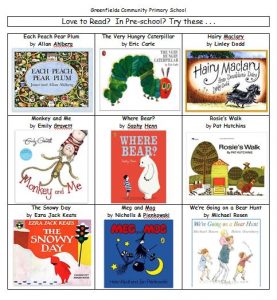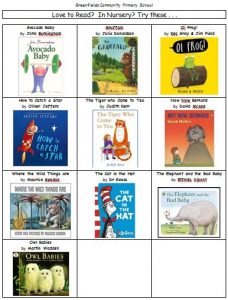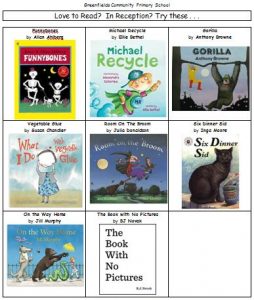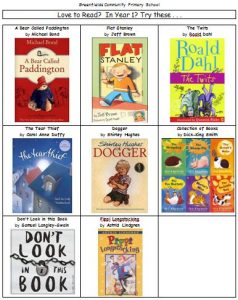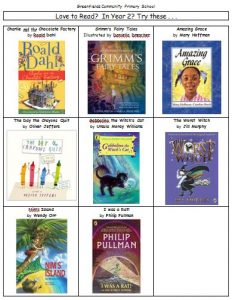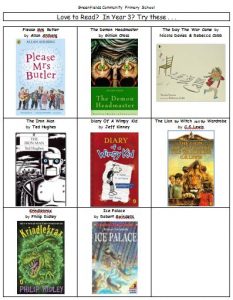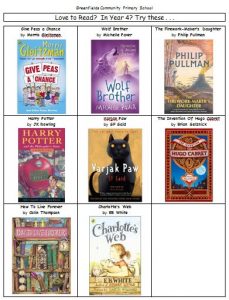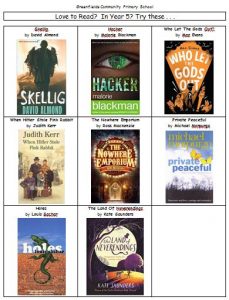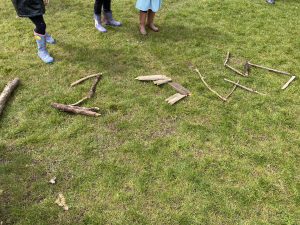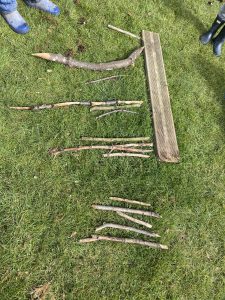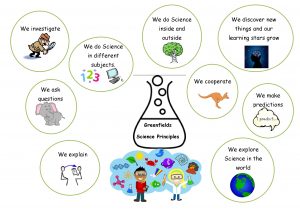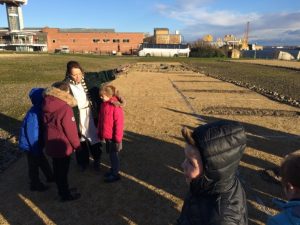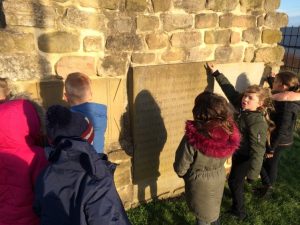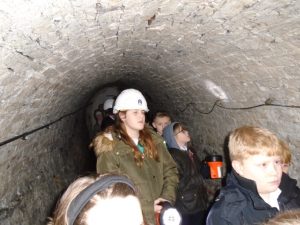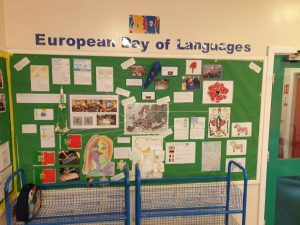This page shows who is leading each of the curriculum areas/subjects at Greenfields during 2020/21.
English – Writing
Leader: Miss Evans
At Greenfields we believe that children enjoy writing and are successful when writing for a purpose. Using quality books as a starting point for all children, they are given regular opportunities to write in context. We discuss audience and purpose with the children from a young age so they develop a good understanding of why they are writing and what the reader needs from each text.
Throughout school we teach specific text types and always use relevant and appropriate texts as a model to develop the children’s understanding of the genre. We analyse the structure and language features of the text and regular spelling, punctuation and grammar sessions ensure that the children are well prepared for their own composition.
We strive to develop and extend the children’s vocabulary. Teacher modelling is an integral part of ensuring that children are prepared for their own compositions. To extend the children’s vocabulary, we ensure that they read as often and widely as possible.
Every classroom has an ‘English Working Wall’ designed to support and consolidate the children’s learning as they move through a unit of work. The walls provide hints and tips, examples of rich vocabulary, spellings, collaborative work by the children in groups or talk partners – everything the children need to be successful.
Writing is thoroughly marked giving detailed feedback and prompts support children in moving their learning forward.
English – Reading
Leaders: Miss Evans
At Greenfields, we believe that learning to read is an essential part of every child’s education, because reading is the key to success. As well as teaching children how to read, we aim to foster a love of reading in our children through exposure to exciting, challenging and meaningful texts throughout the curriculum.
Learning to Read
At Greenfields, we teach the children to read through phonics. Simply put, this is the process by which speech is written. In Early Years and KS1, children have daily phonics sessions, using the Read, Write, Inc. programme. Read Write Inc. is rooted in children having lots of chances to overlearn; to hear and say the sounds they need to read and in turn overlearn what these sounds look like when they are written down. Children are assessed every 6-8 weeks and are taught in groups with children who know the same sounds as them fluently.
To support our teaching of phonics and the children’s overlearning of the sounds they need, we send home reading books for you to use at home. Books are changed once a week, with the children taking home at least 2 reading books.
Children take home a small ‘paper’ book which is mainly grey and white inside. This is for children to practise at home the sound that they are learning in their phonics lessons. These books are quite short and the words in them often rhyme. They give the children an opportunity to ‘overlearn’ the sound and there are some questions at the back of this book which parents can also look at with their children.
Children also take home a glossy ‘book bag book’. This is a story book that allows the children to practise the sound they are learning in a different context.
We ask parents and carers to spend 10 minutes after school reading both of these books with their children. The books are not designed to be overly challenging; they contain sounds we know the children have learnt and provide them with the opportunity to become fluent in reading those sounds.
You can also follow this link to find out more about Read, Write, Inc:
http://www.ruthmiskin.com/en/read-write-inc-programmes/phonics/
Reading to Learn
Reading and discussing stimulating fiction, non-fiction and poetry in class also develops children’s comprehension skills. Every day children throughout school receive explicit teaching of reading skills. Children need good linguistic knowledge (in particular of vocabulary and grammar) and a broad knowledge of the world. Throughout the curriculum we plan enriching learning experiences, in and out of class, to broaden the children’s knowledge of themselves and the world. In KS2, we have daily reading skills sessions which last 30 minutes, in addition to our English lessons. We ensure that the children read a range of fiction non-fiction and poetry in these sessions; texts are chosen to support learning in Science, Geography, History, RE and PSHE where appropriate. The sessions are broadly arranged as follows:
Monday – activities that focus on the vocabulary needed to understand the text
Tuesday – Book Talk, a structured class discussion based on a piece of text, where children are encouraged to come up with their own opinions and try to persuade others, all based on the evidence they read
Wednesday – Shared Reading, which is where the teacher models good reading aloud of the text. The children take their turn reading aloud as a whole class, small groups and independently, and analyse their fluency
Thursday – explicit teaching a particular reading skill eg inferring or summarising
Regular sessions are planned in for Reading for Pleasure, where children can choose whichever book they like to read and enjoy; these sessions can take place in our school library and children are encouraged to share books with each other and see reading as a sociable activity.
Reading for Pleasure
Books are at the heart of school life at Greenfields, and we want our children to discover their own genuine love of reading. In order to do this, we have in place a number of ways to show them that reading is, above all, fun!
- Class reader – this is a book that the children help to choose and is read aloud every day, for pure enjoyment.
- Inspirational and interactive book corners – each classroom has an inviting book corner with specially selected books for children to borrow. Each class has devised a way of recommending their own favourites to their friends, including teachers!
- Weekly reading recommendations – each week, in the school newsletter, a member of staff and a child or two get to tell us about their favourite book.
- Book Chat – talking about books is actively encouraged! We make time for informal conversations about books whether this is between staff and children, or among the children themselves. We think this is vitally important as it can lead children to discover new titles and authors they may never have met before in a relaxed way.
- World Book Day – always a date to look forward to; this is when we get to celebrate our favourite books and authors
- Offering a wide range of texts – we know that children, just like adults, all have different tastes when it comes to reading, so we try to offer a wide range such as graphic novels, non-fiction, poetry and weekly publication such as First News or The Junior
What can you do at home?
Research shows that a child who reads for pleasure every day greatly increases their life chances. Here are some ideas you can try at home:
- Make books part of the furniture at home – Always have books around do that you and your children are ready to read whenever there is a chance. It doesn’t have to break the bank to stock a bookshelf – there are plenty of second-hand shops where you can pick up lovely books for around 50p.
- Join your local library – Get your child a library card! And they often sell off old stock very cheaply too.
- What is your child interested in? – Help them find the right book – it doesn’t matter if it’s fiction, poetry, comic books or non-fiction.
- All reading is good – Don’t worry if your child only seems to like reading the newspaper; leaflets, cereal packets, instruction manuals, comics are all good practice. Reading is reading – it is all valuable!
- Get comfortable! – Snuggle up somewhere warm and cosy with your child, either in bed, on a beanbag or on the sofa. DO they have somewhere they can read comfortably on their own too?
- Ask questions – To keep them interested in the story, ask your child questions as you read such as, “What do you think will happen next?” or “Where did we get to last night? Can you remember what has happened already?”
- Read whenever you get the chance – Bring along a book or magazine for any time your child has to wait, such as at the dentist’s, or on the bus.
- Read again and again – Encourage your child to re-read favourite books and poems as many times as they fancy. This is a great way to build up fluency and confidence.
- Bedtime stories – Regularly read with your child or children at bedtime, no matter how old they are! It’s a great way to end the day and to spend valuable time with your child.
- Rhyme and repetition – Books are great for encouraging your child and children to join in and remember the words.
You can follow these links for information, hints and tips about reading with children, whatever their age:
http://www.booktrust.org.uk/books/children/have-some-fun/#/d/booktrust/have-some-fun/children/
http://www.booktrust.org.uk/books/children/have-some-fun/#/d/booktrust/have-some-fun/children
http://games.e4education.co.uk/groupone
If you would like any more information about reading, please contact school and we’ll be happy to help.
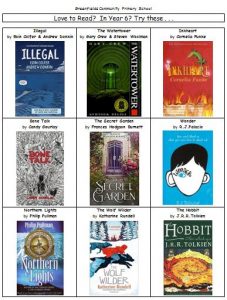
English – Speaking and Listening
Leaders: Miss Evans
At Greenfields, Speaking and Listening is an essential tool for all areas of the curriculum. We encourage our pupils to speak clearly and confidently and articulate their views and opinions. Pupils are provided with a range of activities that are embedded across all areas of the curriculum including role play, talk partner work, group discussions and class debates. Children are also given the opportunity to develop speaking and listening skills in assemblies and performances.
In Early Years we place huge emphasis on speaking and listening, offering quality opportunities for children to experience and overlearn new words and use of language, using their needs and daily routines as well as picture books, familiar stories and nursery rhymes.
In KS1 strategies from Talk 4 Writing are often used, where the children learn a model text by heart, using story maps and actions to really embed the sentence structures in their memories. They then use these structures to create their own stories, and love to perform them to their peers!
In KS2 we teach skills such as discussion through regular activities eg Book Talk, where sentence stems are provided for children to use to introduce an idea or to expand on, or even disagree with, their classmates. We have a strong focus on prosody (reading aloud fluently with correct expression and emphasis) in our Shared Reading sessions, where teachers expertly model how a text should be read, support children to analyse how to do the same, then provide the opportunity for them to repeatedly practise this so they then become the experts. Teachers plan in many opportunities throughout the school day for children to read aloud to partners, to adults or to the class, and also model these skills for the children to hear.
Speaking and listening is vital in all subjects of course, and many of these skills and strategies are embedded across the curriculum.
Maths
Leader: Mr Coverdale
In maths, we ensure that children are at the heart of our teaching and learning. We aim to make maths an inspiring, creative, rigorous, and practical subject. We want to ensure that every child has a depth of understanding and that processes are embedded so they can draw on this in everyday contexts. By breaking learning down into small steps we aim to ensure that every child gains a good understanding of mathematical concepts which they can then apply to different situations. At Greenfields, we follow the ‘teaching for mastery’ approach through NCETM which allows for consistency across the school. It is important that each year group progresses from the previous one and that teachers have a clear understanding of what has been taught before.
Every day, the children in KS1 and KS2, take part in a ‘number talk’ session. ‘Number talk’ is a strategy to build flexibility, accuracy and efficiency in
mathematical thinking through the discussion and sharing of mental maths
strategies. It is a short daily routine that allows pupils to contribute to
meaningful dialogue concentrating on how to answer mathematical calculations. ‘Number Talk’ is a powerful tool for helping students develop fluency when adding, subtracting, multiplying and dividing.
In maths, we revisit the same concepts each term allowing children the opportunity to build on previous knowledge and begin to master the acquired skills in different contexts. Through continuous assessment for learning, teachers ensure that children progress quickly at pace, address misconceptions and are challenged to grapple with new contexts. Year on year, our children can build on their skills, develop resilience within their learning and have the confidence to start a new year with the knowledge they have already gained, ready for new challenges ahead.
The aim of our maths curriculum is to ensure that all pupils:
- Acquire the skills and knowledge to apply their mathematical skills in a number of different contexts
- Develop mastery in maths and apply skills to reasoning and problem solving
- Develop a number of mental strategies and apply this across the curriculum
- Regularly revisit areas of the maths curriculum in order to regularly recall previously learned knowledge
- understand the place of maths in everyday life
Science
Leader: Mrs Banks (*SLE)
Science at Greenfields Community Primary is co-ordinated by Mrs Banks, who is a Specialist Leader of Education for Science. Mrs Banks also delivers Science training to other schools through the STEM Learning Partnership.
As recognition for the high quality Science work that goes on throughout the year groups, from our 2 year old provision up to Year 6, our school has earned the Primary Science Quality Mark Award. We are extremely proud of this award. The Primary Science Quality Mark is a highly successful, unique award programme to develop and celebrate the profile of science teaching, learning and leadership in primary schools. Science subject leaders join a local PSQM hub and are supported by professional development to achieve the Primary Science Quality Mark for their schools. We are due to renew our PSQM status and will be looking at going for the GILT or Outreach award to show how our work in Science has been sustained since the last time we were assessed.
Our children’s views are at the heart of our Science planning. We asked them, ‘What makes a good Science lesson?’ and this was how we came up with ‘Science at Greenfields’ key principles. Outdoor Learning is a huge part of our Science curriculum and each year group have 5 weeks of Forest School sessions with our Forest School Practitioner Mrs Creedy.
In Science, we aim to develop the children’s knowledge and understanding of the world around them. In accordance with the National Curriculum guidelines, the children in each phase have experience of topics drawn from Biology, Physics and Chemistry. They learn to question and discuss how science can be used to explain what is occurring, predict how things will happen and analyse the causes.
The children learn about the different types of scientific enquiry and, by the time they get to Upper Key Stage 2, independently choose which enquiry type is best to answer scientific questions:
Types of scientific enquiry
- Observation over time
- Research
- Pattern seeking.
- Identifying, grouping and classifying.
- Problem-solving.
- Comparative and fair testing.

In nursery & reception the children follow the Early Years Foundation Stage curriculum and science is very much intertwined in everything they do. This includes technology, people and communities and Understanding the World. They explore science topics using their senses to develop their skills of observation, prediction and discussion. They make use of their environment, for example bringing some snow, leaves or soil into the class to investigate, explore and make predictions.
In Key Stage 1 the children use practical, hands-on experiences, books, photographs and videos to look closely at the natural and humanly-constructed world and are encouraged to be curious and ask questions, and build on the foundation laid down in Early Years. They begin to write at length about their investigations and predictions.
By using scientific processes – observing, problem solving, pattern seeking, predicting outcomes of experiments and communicating findings in a variety of ways – the children begin to develop their understanding of scientific ideas.
In Key Stage 2, the children broaden their scientific view of the world by exploring, talking about, developing and testing their ideas. They then use their evidence, scientific knowledge and understanding to justify and explain their findings using more complex scientific vocabulary.
We believe that with the experience of scientific processes and a wide range of topics the children will be well equipped to meet the challenges of science work in their future school years and life beyond.
At Greenfields we like to make our learning fun and hands on so we widen the children’s opportunities wherever possible. We enhance their learning by going on visits, inviting science experts in and becoming involved in many local and national initiatives.
Each year we hold a Science Week where we explore current issues such as climate change, sea pollution and plastic litter in our oceans.
Art and Design
Leader: Mrs Cockman
At Greenfields we aim to provide a broad balanced and progressive Arts curriculum. The school’s aim is to enable each child to reach their full potential in Art, through investigating and making, research and the development of skills and through the evaluation of their own artwork and that made by others.
To achieve that aim the school plans a range of activities in art which provide opportunities for pupils to:
- Record responses to experience and imagination and to observations of the natural and made environment
- Gather resources and materials, using them to stimulate and develop ideas
- Explore and use two and three dimensional media, working on a variety of scales
- Review and modify their work as it progresses
- Develop understanding of the work of artists, craftspeople and designers from a range of times and cultures and apply this to their work
- Respond to and evaluate art, craft and design, including their own and the work of others.
Each year all of our children experience a wide range of arts and culture based activities both in and outside the classroom. This could be through reflection, visits and visiting artists. We have recently extended our reflection session where parents can visit the school and create crafts with the children. This gives the children the opportunity to explore a variety of materials and ways of joining them in different ways.
Educational visits are part of our curriculum from nursery onwards and these allow the children to consolidate learning and improve their knowledge, skills and understanding in art. Teaching through the Arts allows all children to experience success regardless of ability background or gender.
Visits to local theatres, galleries, museums etc. will involve the children in activities that will encourage children, staff and families to engage in the arts/culture opportunities on offer in the region. Visits to museums and places of interest have taken place emphasising the importance of providing stimulating, meaningful, hands-on cultural activities for everyone.
We have the Artsmark gold award which gives us the opportunity to share practices between like-minded schools within the region so that we can be inspired, learn from each other, further improve our practice and make a positive contribution to the Arts within all of the schools participating. By working alongside the partner schools and utilising the external expertise on offer form Culture Bridge North East, North Tyneside Learning Trust (music and art hub), local museums and galleries, other local arts and culture provider’s schools etc. we will all be able to make a positive impact on the already vibrant culture of the North East.
The Art and Design Programmes of Study can be found on this external link
Design Technology
Leaders: Mrs Leslie
At Greenfields, we ensure that children are at the heart of our teaching and learning in DT. We aim to make DT an inspiring, creative, rigorous, and practical subject. Our D.T. curriculum is broken down into two parts – the first is to design, make & evaluate an invention and the second is linked to cooking, nutrition & healthy eating.
DT links are made to key topical issues and, where relevant, our History & Geography curriculum, to ensure the pupils design and make products that solve real and relevant problems. They draw on subject knowledge from STEAM subjects (Science, Technology, Engineering, Art and Maths). By making links to DT during STEAM and World of Work workshops, we aim to show the children the careers than could be open to them in the future with design & technology skills.
At Greenfields we like to make our learning fun and hands on so we widen the children’s opportunities wherever possible. We enhance their learning by going on visits, inviting science experts in and becoming involved in many local and national initiatives. In recent years, children have participated in webcasts with inspirational engineers in the UK, had visits from STEM ambassadors from the Northumberland County Council Business Enterprise team plus real –life engineers from RAF Boulmer and BT. We also encourage parent involvement and have had parents & carers into school to talk to children about their careers, making them aware of the wonder or the world of work and future careers to think about.
DT lessons also help to educate the children in nutrition and the teaching of cooking skills and techniques. Not only that, but all children at Greenfields have the opportunity to cook outside during their Forest School sessions.
Geography
Leader: Mr Lumsdon
In Geography at Greenfields we aim to stimulate children’s interest, initially in their immediate environment and subsequently in other environments on the earth’s surface. We hope to foster a sense of wonder at the beauty of the world around and thus to develop an informed concern about the quality and care of the environment. Throughout the geography curriculum we also aim to educate children about the global goals and steps we can take to help implement these vital measures.
Our Geography curriculum is designed to:
- Increase children’s knowledge and understanding of their own locality, the E.U. and contrasting localities in the wider world that will help them set local, national and international events within a global context.
- Develop an awareness and understanding of features, physical processes and change in their immediate environment and other localities which they study.
- Enable children to understand and compare the physical and human characteristics and processes e.g. weather, settlement, transport and employment in different localities.
- Enable children to appreciate and compare the environment and to understand how and why people seek to manage and sustain environments and to identify ways in which damage can be repaired.
- Develop the skills, knowledge and understanding necessary to identify and investigate important cultural, social and environmental issues with sensitivity to people’s attitudes and values.
- Help children to develop an understanding of the nature of multi-cultural and multi-ethical societies and a sensitivity to cultural and racial prejudice and injustice.
- Develop competency in using maps, atlases, photographs, fieldwork techniques and to develop skills appropriate to geographical enquiry e.g. the ability to observe, analyse and communicate, to gather and interpret information and use ICT to support their learning where appropriate.
 We have been awarded the prestigious Primary Geography Quality Mark. It is a highly valued award which recognises and promotes quality and progress in geography leadership, curriculum development and learning and teaching in schools.
We have been awarded the prestigious Primary Geography Quality Mark. It is a highly valued award which recognises and promotes quality and progress in geography leadership, curriculum development and learning and teaching in schools.
 Our school is committed to the importance of an international dimension to our curriculum and have been accredited with The International School Award. The award recognises that at Greenfields we promote global citizenship and celebrate cultural diversity. Our pupils engage in meaningful and stimulating communication with their peers in Australia and Bermuda. We also address global issues and focus termly on one of the UN Global Goals for sustainable development.
Our school is committed to the importance of an international dimension to our curriculum and have been accredited with The International School Award. The award recognises that at Greenfields we promote global citizenship and celebrate cultural diversity. Our pupils engage in meaningful and stimulating communication with their peers in Australia and Bermuda. We also address global issues and focus termly on one of the UN Global Goals for sustainable development.
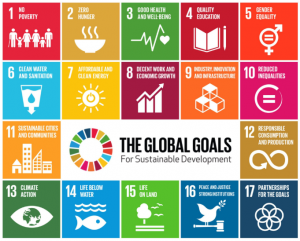
History
Leader: Mr Lumsdon (*SLE)
At Greenfields, we are very proud of our curriculum. This really develops the children’s ability to learn about history and it gives more depth of opportunity to the teachers. From EYFS to Year 6 we have developed strategies and techniques within our curriculum to develop historical knowledge, skills and understanding.
The aims of history at Greenfields are in line with the National Curriculum, they are to ensure that children:
- Know and understand the history of the British Isles as a coherent, chronological narrative, from the earliest times to the present day: how people’s lives have shaped this nation and how Britain has influenced and been influenced by the wider world
- Know and understand significant aspects of the history of the wider world: the nature of ancient civilisations; the expansion and dissolution of empires; characteristic features of past non-European societies; achievements and follies of mankind
- Gain and deploy a historically grounded understanding of abstract terms such as ‘empire’, ‘civilisation’, ‘parliament’ and ‘peasantry’
- Understand historical concepts such as continuity and change, cause and consequence, similarity, difference and significance, and use them to make connections, draw contrasts, analyse trends, frame historically-valid questions and create their own structured accounts, including written narratives and analyses
- Understand the methods of historical enquiry, including how evidence is used rigorously to make historical claims, and discern how and why contrasting arguments and interpretations of the past have been constructed
- Gain historical perspective by placing their growing knowledge into different contexts, understanding the connections between local, regional, national and international history; between cultural, economic, military, political, religious and social history; and between short- and long-term timescales.
At Greenfields, the teaching and learning of History focuses on enabling children to think as historians. The objectives of history teaching are based on the requirements of the National Curriculum programmes of study for Key Stages 1 and 2.
In both Key Stages 1 and 2 children focus on three strands:
- Chronological understanding
- Knowledge & interpretation
- Historical enquiry
At Greenfields, history involves:
- Sequencing events chronologically with the use of dates and key events across periods
- Exploring concepts through historical enquiry by asking and answering questions
- Interpreting similar events in history and understanding that different versions of the same event exist
- Looking at continuity and change to understand how the world has developed around us
- Understanding the cause of significant events and the consequences thereafter
- Noting similarities and differences from across periods and comparing them to our own lives
- Understanding the significance of key events and the impact they have had on the world.
This is achieved through activities such as:
- Going on educational visits in the local area and places further afield in the UK.
- Working with artefacts to discover more about different periods
- Creating working walls as a class that explore lines of enquiry
- Using resources in all phases to bring to life abstract concepts such as the Stone Age, the Romans and Mayans.
- Linking our history work at school to the wider community, particularly in early years and key stage one so that pupils can draw upon experiences to link with their learning.
- The use of primary and secondary sources to support teaching and learning.
Early years
In pre-school, nursery and reception, history is taught as an integral part of thematic work covered during the year. In Early Years, history is related to ‘Knowledge and Understanding of the World’ as set out in the Early Years Foundation Stage Curriculum and it is about the children beginning to understand chronology, understand that things change over time such as the decay of fruit and vegetables or the ageing of a human being. Also, children begin to use time-related vocabulary to be able to sequence the past, present and future.
Key stage 1
In Key Stage 1, history is about developing knowledge, skills and understanding relating to the children’s own experiences with a large focus on understanding chronology and the local community around them. This acts as the foundation so that when the children reach Key Stage 2, they have enough knowledge and experience to be able to learn about more abstract historical concepts, such as the Mayans, the Romans and the Stone Age more effectively.
Key stage 2
In Key Stage 2, history is about developing knowledge, skills and understanding relating to different periods of history, intertwined with the development of more local topics. Pupils will begin to weigh up historical evidence and use historical terminology fluently in their lessons. By the time pupils reach the end of Year 6, they should have a clear understanding of the world around them and why it is the way it is whilst being able to judge the validity of certain information.
Educational visits
We aim to put educational visits at the centre of our planning so that pupils can complete enough prior learning so that they can get the most out of every trip:
Recent developments in history at Greenfields
Historical Association Quality Mark Gold award
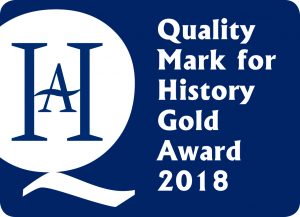
We are very proud to have been the first school in the North East to have been awarded the History Quality Mark and to have achieved the Gold standard that recognises the excellence of History provision in a school.
The assessor commented that the school has much to celebrate and has particular strengths, such as our approach to assessment in History.
English Heritage Schools
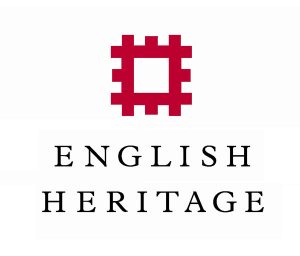
Last year we worked with Viki Angel who runs ‘English Heritage Schools’ for the North East of England. Through this, we have been bringing new life to some of our more local history topics. We received the award at the end of the most recent academic year and we are now an English heritage school.
This year we are continuing to develop our history provision so that there is clear progression across year groups, a variety of challenges being used to enhance historical thinking in school as well as a variety of approaches being used to ensure pupils get the support they need in history lessons.
We are working with some other schools to improve their history curriculum and they have also been sharing some ideas with us to ensure that children are getting the best possible history curriculum available.
For any more information about our school’s approach to history or if you feel you can contribute to anything our school is involved in this year, please do not hesitate to contact the school and ask to speak to Daniel Lumsdon, History subject co-ordinator and Specialist Leader of Education for History.
RE
Leader: Mrs Wilson
RE is taught throughout the school and follows the North Tyneside Agreed Syllabus for RE. The overall aim of the subject is to enable pupils to develop respect for different beliefs whilst providing them with the opportunities to develop and discover their own personal values. The curriculum reflects the fact that the UK is a multi-cultural society with Christianity as its main religion. The teaching of RE is both creative and varied. Approaches include food tasting, drama, visiting the local Church, exploring festivals through art, re-telling important stories and considering personal beliefs.
S.T.E.A.M.
Leader: Mrs Banks
S.T.E.M. refers to Science, Technology, Engineering and Mathematics.
However at Greenfields we have S.T.E.A.M.! Yes, ART is also part of our S.T.E.M. curriculum. Art skills are often an integral and valuable part in design projects. This became very apparent in our participation in the ‘If you were an engineer, what would you do? Leaders Award, last year. Children from Reception, and years 1 to 4 entered this national competition to design and invent a product. Three of our pupils got through to the North East finals and their work was displayed at the Discovery Museum. All the children used their art skills to explain and display their engineering product designs. Following this success, children will be entering this years competition as well as the ‘Billion Ideas’ competition. Again, pupils from year 4 represented Greenfields at the regional final last year.
By inspiring and motivating our children, our aim is to ensure that all children see the values and opportunities these subjects offer. Through our creative enquiry based curriculum we teach the S.T.E.A.M. knowledge and skills that they will need, to take an active role in our increasingly scientific, and technological society.
Where possible, we also reach outside the classroom to enhance and enrich the school curriculum by making links with the world of work, so that children can relate school S.T.E.A.M. subjects to real world experiences. Through taking part in lessons, workshops, demonstrations and activities linked to businesses and industry, children at Greenfields can gain insights into the various job roles open to them and get excited about the new directions their studies could take them in. We have recently committed to working alongside the Education Business Partnership Service so that the children from year 2 to year 6 participate in activities that introduce the children to the world of work. S.T.E.M. ambassadors from many professional careers come and work alongside the children to encourage them to work in teams to take on work roles to produce an end project. Other S.T.E.A.M. projects include our participation in the national Polli:nation scheme. We are currently working on maintaining and improving our pollination areas within school . All year groups have been allocated spaces to maintain and use for S.T.E.A.M. projects and outdoor learning.
Links have been made with North Gosforth academy with Year 5 children attending a S.T.E.M. day and participating in computing, science and maths activities including programming Micro-bots!
Greenfields University courses that have run include Coding club, Programming, Engineering for KS1, Young inventors, Creative Engineering, Gardening Club, Young Botanists plus many more.
All the above projects have already provided our children with valuable experiences that we hope will encourage our children to raise their aspirations, spark their interest in the S.T.E.M. subjects and help them prepare for the demands of the 21st century workplace. Watch this space as we continue to S.T.E.A.M. ahead!
Computing
Leader: Mr Coverdale
The new National Curriculum has introduced a new subject in the form of “Computing” which now replaces the subject “ICT” (Information Communication Technology)
The use of computers, tablets, programmable robots, digital and video cameras is an integral part of the National Curriculum and is a key skill for everyday life that can be used to acquire, organise, store, manipulate, interpret, communicate and present information.
There is a focus on computational thinking and creativity, as well as opportunities for creative work in programming and digital media through three aspects of the computing curriculum:
Computer science (CS): Understanding algorithms, creating and debugging computer programs, using logical thinking and understanding how computer networks (including the Internet) work.
Information technology (IT): Using technology purposefully to create, organise, store, manipulate and retrieve digital content.
Digital literacy (DL): Using technology safely, respectfully and responsibly. The use of networks and The Internet to provide opportunities to collaborate and communicate.
At Greenfields Community Primary School we recognise that pupils are entitled to quality hardware and software and a structured and progressive approach to the learning of the skills needed to enable them to use it effectively. We provide each class with a suite of tablet laptops to ensure that Computing is taught as an integral part of the curriculum, both alongside and within our Enquiry based curriculum.
The Computing National Curriculum Programmes of Study can be found at this external link
Foreign Languages – French
Leader: Mrs Leslie
Learning a foreign language can broaden horizons and provide an opening to other cultures. We want to foster children’s’ curiosity and deepen their understanding of the world. Through language learning, we encourage children to explore and respect different beliefs and cultures and enjoy learning about the world around us.
The national curriculum for languages aims to ensure that by the end of Key Stage 2, all children:
- understand and respond to spoken and written language from a variety of authentic sources
- speak with increasing confidence, fluency and spontaneity, finding ways of communicating what they want to say, including through discussion and asking questions, and continually improving the accuracy of their pronunciation and intonation
- can write at varying length, for different purposes and audiences, using the variety of grammatical structures that they have learnt
- discover and develop an appreciation of a range of writing in the language studied.
Language learning at our school
At Greenfields, French is taught in all year groups from Year 1 to Year 6. Our focus is on practical communication. We follow the North Tyneside scheme of work, which has a balance of spoken and written language, to ensure a progressive and balanced curriculum throughout school. When learning French, we use a range of social skills and participate and cooperate with our peers through speaking, listening, reading and writing.
Each year group covers two units of work per year following the North Tyneside scheme:
Year 1 – Unit 1: ‘Je parle français!’ & Unit 2: ‘Je me présente’
Year 2 – Unit 3: ‘Moi et Ma Famille’ & Unit 4: ‘Les Animaux’
Year 3 – Unit 5: ‘Mon Anniversaire’ & Unit 6: ‘Le Monde’
Year 4 – Unit 7: ‘Mon école et moi’ & Unit 8: ‘Qu’est-ce que tu veux?’
Year 5 – Unit 9: ‘Les Sports’ & Unit 10: ‘Les Vêtements’
Year 6 – Unit 11: ‘J’habite’ & Unit 12: ‘Un pays francophone’
Alongside these units we integrate languages into the everyday curriculum, for example:
- Signs around school are written in both English and French, so that children are introduced to new vocabulary which is meaningful
- Classroom commands are often given in French
- Registers are often taken in different languages
- PE warm ups are sometimes given using French vocabulary e.g. repeat/jump
European day of languages
Every year, we celebrate European Day of Languages by having our own ‘European day’.
Each class selects a country in Europe to study. The children learn about a range of things such as the country’s main land features, key cities and towns, famous landmarks, food specialities, famous people and key events in the country’s history. The day is always full of research and practical activities like artwork and food tasting – we always thoroughly enjoy it!
Music
Leader: Mrs Wilson
At Greenfields we provide a broad, balanced and progressive music curriculum which is taught as a discrete subject linking to our school values- be brave and be bold. We aim for our music provision to be embedded and exceed the national curriculum and to support our pupils to realise their music potential.
High quality school music education consists of three distinct, but interlinked areas of provision;

As soon as our children start with us at Greenfields, Music is high on our agenda. We strive to deliver high-quality music provision for all pupils in the three areas of curriculum, co-curricular and enrichment, and against the following key features:
- Timetable discrete curriculum music sessions
- Clear, music progression through our carefully planned out music curriculum starting in our Early Years
- Access to lessons across a range of instruments
- A school choir
- Develop a school ensemble/band/group.
- Our fully equip music room hosts our sessions
- Termly school performance
- Opportunities for our children to enjoy live performance at least once a year
Singing really is an integral part of our school day at Greenfields. Each week we gather as a whole school for a singing assembly with songs which match the season or theme we are learning about.
We work closely with North Tyneside Music Hub, who supports us to deliver instrumental lessons to all of children. Year 1 and 2 learn the recorder, Year 3 and 4 learn how to play the ukulele and Year 5 and 6 learn the drums.
We have a ‘Take Ten Pieces’ day every year at Greenfields. Each class takes a piece of music, listens to the music and gets inspired we do a piece of writing, art or create something from the music.
Look at some of the opportunities our children have already had this year;
Songs around the campfire at Dukehouse Wood

Playing of the Bugle at the Remembrance Service

Seeing the Cold Stream Guards at Newcastle Cathedral

Each class performed a Harvest song at our Harvest Festival

In all of our Early Years Environments children have access to a range of instruments

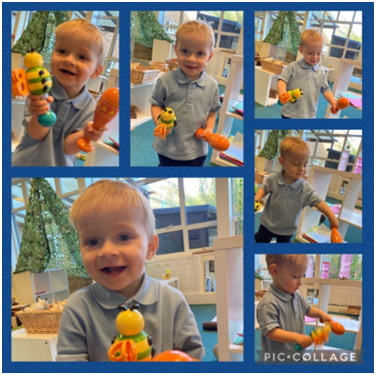
In Muddy Bairns our 2 year olds enjoy weekly Rhythm Time sessions and in Nursery our children work with Piccolo.

PE
Leader: Mrs Armer (*SLE) & Mrs Leslie
Greenfields is committed to providing outstanding PE provision, both as part of the school
curriculum, and through extra-curricular opportunities. We want to promote pupil health and
wellbeing, and to raise standards of attainment across the curriculum.
Curriculum
You can read our PE curriculum here
A wide range of activities are delivered in school which aim to engage and inspire all children. We aspire to provide at least 2 hours per week of high-quality planned PE. We have a PE curriculum that offers a broad range of sports; focusing on a challenge and developing skills, fitness at an individual level, raising aspirations, sportsmanship and increasing the health and life long sporting passion for all. The school’s PE provision is based on both the new National Curriculum and on the key findings of the Ofsted publication ‘Outstanding physical education for all’.
At Greenfields we offer a high-quality curriculum which is inclusive and is designed to meet the needs of all pupils. We try to cater for all our children’s needs and to ask the children which clubs they would like to see at Greenfields, this is done by Pupil Voice through the School Council. We track all our children’s participation in school clubs and sporting events in order to monitor participation and help to ensure we can provide something for all.
Over the year, each child will participate in games, athletics, dance and gymnastics lessons with swimming for KS2.
Adventurous activities are offered to children in Years 5 and 6 and include climbing, canoeing, problem solving, orienteering and archery which are delivered while they attend annual residential trips.
Events
PE and sport has a high profile in our school and permeates many aspects of school life. In the Summer term we hold our annual Sports Week in which we encourage participation of all children and organise competitive races which also include a parent’s event. We have Sports fundraising and charity events such as taking part in Sports Relief and the Cancer Run.
Clubs:
We wish to complement the PE curriculum with a wide range of alternative as well as traditional sports through our extra-curricular sporting activities. We hope to capture pupils interest and enthusiasm and nurture a lifelong commitment to participation in sports and physical activity. We use outside coaches to enhance the variety of activities we can offer. This year we have a coach in from Newcastle United Foundation to deliver weekly sessions in sports and multi-skills for the children in Reception to Year 6. The activities and skills taught have also been
applied and progressed within PE lessons as they were enjoyed so much by the children. The coach from Newcastle United Foundation also provides Lunchtime Games and an after- school club with Year 3 and 4 (Autumn term) and Year 1 and 2 (Spring term) on a Thursday. Our teachers are a great resource for sports clubs this year, with Mr Irving leading shadow boxing and Mrs Robinson delivering a KS1 multi skills club.
Mr Lumsdon runs a football club for KS2 on a Tuesday and Mrs Martignone and Ms Leslie also offer a lunch time dance club.
Every year children who did not achieve their 25m badge in Year 4 are given the opportunity to attend swimming booster sessions. We use some of the sport premium money in this way to offer another chance for children to reach the required standard in swimming by the time they leave our school.
Last year we were lucky enough to have a full day of coaching sessions going on in school with the Newcastle Falcons working with children from Year 1 up to Year 6.
Competition
We enter a wide range of competitions, particularly through our work towards achieving the School Games mark each year.
Throughout the year we enter into, and practice, for a number of different competitions such as Y5/6 Hockey tournament, Athletics, and Gymnastics. We like to make sure we enter into a range of competitions that are offered to children across the school and for children of all abilities.
The children are always a credit to our school and demonstrate excellent sportsmanship, but it is also wonderful to celebrate their success.
We take part in the North Tyneside Dance festival every year. This year the dance is based around ‘New beginnings”. The children are working hard every week to develop their own choreography alongside Mrs Martignone. We are very excited to go to Whitley Bay Playhouse in March and perform in front of a full audience.
PE and Sports Funding
The government is providing additional funding to improve the provision of physical education (PE) and sport in primary schools. This funding is ring-fenced and can therefore only be spent on the provision of PE and sport in schools.
At Greenfields we have used our PE funding in a variety of ways and split the funding into three key areas, Physical Education, Healthy Lifestyles and Competitive Sport. The PE & Sports Funding document below gives full details about the impact of the way we spent the money last year and how we intend to spend the money this year:
PSHE and Citizenship
Leader: Mrs Cockman
What is PSHE? Personal, Social, Health and Economic (PSHE) education supports pupils to be safe, healthy and prepared for modern life. The PSHE education curriculum covers a range of key issues facing children and young people today, including those relating to relationships, mental and physical health, staying safe and aware online, financial literacy and careers.
PSHE at Greenfields – We are committed to investing in our pupil’s health and well being and by doing this we contribute to raising the pupil’s achievements. PSHE helps to give children the knowledge, skills and understanding that they need to stay healthy and safe, develop worthwhile relationships, respect differences, develop independence and responsibility, make the most of their own abilities and those of others. Therefore PSHE underpins our school ethos and reinforces our vision.
Pupils are encouraged to take part in a wide range of activities and experiences across and beyond the curriculum, contributing fully to the life of their school and communities. In doing so they learn to recognise their own self worth, work well with others and become increasingly responsible for their own learning. They reflect on their experiences and understand how they are developing personally and socially, tackling many of the spiritual, moral, social and cultural issues that are part of growing up.
We teach pupils how society is organised and governed. We also ensure that they experience the process of democracy in school through the School Council. Pupils learn to understand and respect our common humanity; diversity and differences so that they can go on to form the effective, fulfilling relationships that are an essential part of life and learning.
*Three of our subject co-ordinators have been awarded Specialist Leader in Education (SLE) status in their subject specialism.

